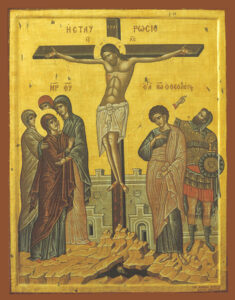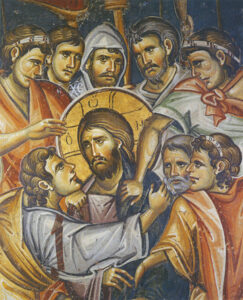We all know that in the Orthodox Church the Divine Liturgy is always a celebration, not allowed during the penitential weekdays of the Great Lenten Fast. We also know that Holy Week is our most penitential period. Furthermore, running with our peculiar Holy Week schedule (which I’ll not go into again here), this actually turns out to be a Vesperal Liturgy for the Eve of Holy Friday, our greatest and most solemn Fast Day.
This leads to an obvious question:
Why (seemingly breaking our rules) do we Orthodox have a Divine Liturgy for Holy Friday?
This is how I understand it. Herein, I think, lies the Orthodox understanding of the Death of Christ. We see Christ’s Crucifixion as a victory to be celebrated.
We Orthodox do not believe that Christ, by His agony and suffering on the Cross, somehow “paid the price of our sins” to a Father who was otherwise, for some reason, unable or unwilling to forgive us. * We do not see Christ’s Crucifixion as something to mourn and grieve over. Of course He suffered – terribly – but Orthodox devotion does not focus on that.
- We believe that “substitutionary doctrine of the atonement” is not found in the Scriptures, but is rather a product of the legalistic late Western Middle Ages. It is contrary to the Scriptural teaching that “God is love, and in Him is no darkness at all”, contrary to the image of God as the Father of the Prodigal Son.
The Cross of Christ is a triumph: Christ’s victory over temptation, over the sin of Adam and Eve and all mankind. From the Cross Jesus cried “It is finished!”. He meant not “My suffering is finally over…”, but rather “I have done it! I have completed it! I have loved my Father and the world to the end. I have shown a human Life can be lived without sin, completely ‘on the mark’. I have brought mankind to completion, to perfection, its fulfillment. Now with Me, in Me, all men and women can finally be restored and brought to perfection. And in three days, all will see what this leads to: Resurrection! It is finished! I’ve done it!”
Therefore, Orthodox crucifixes show Christ not in agony but at peace, sometimes even with a quiet look of satisfaction on His face.

That was the meaning of the Crucifixion, and that, I believe, is why we celebrate the full Divine Liturgy for Great and Holy Friday.
So now, even though it seems hardly possible (unless you’re Orthodox and used to it), our Holy Week worship services and readings get even longer. (We Orthodox don’t know how to do “short”. If you want that you’ll have to go elsewhere.)
Henceforth, unless we want the text of these Posts to go on forever, it won’t be possible to try to discuss everything in the readings. If you don’t hear them in church, I hope you’ll read at least some of them for yourself.
You can find them online easily at:
1 https://www.antiochian.org/liturgicday
2 https://www.goarch.org/chapel/
Or if that doesn’t work, you could do something terribly out of fashion and actually read from your printed Bible.
Try to give some time to these readings. Approach in a spirit of prayer. Absorb them. Nothing more important than this has ever happened in the history of the world. But don’t let this reading keep you from church. It is in the Church’s worship that these Scripture readings come alive.
Epistle at Divine Liturgy: 1 Corinthians 11:21- 32
This reading, however, needs to be covered in some detail, because it can be easily misunderstood.
We hear Saint Paul’s account (probably the earliest written account) of the institution of the Holy Eucharist. Then he adds: “For as often as you eat this bread and drink the cup, you proclaim the Lord’s death until He comes.” His triumphant saving death!

He goes on to elaborate regarding the dangers in receiving Holy Communion. He’s writing, you’ll note, to the Corinthians who were forever getting things wrong. In this case, they were approaching the Eucharist casually.
He warns that “Whoever, therefore, eats the Bread or drinks the Cup of the Lord in an unworthy manner will be guilty of profaning the Body and Blood of the Lord.” (How can any doubt that the early Church believed the Eucharist is truly the Body and Blood of Christ?)
It is very important that we not misunderstand what Saint Paul said here. Does he mean that we must be morally perfect before we dare to receive the Holy Eucharist? Of course not. He wasn’t. He called himself “the chief of sinners”. If that’s the requirement, then only Our Lord Jesus and His Mother could receive Holy Communion! I knew a pious Episcopalian couple who never received Holy Communion, and I eventually discovered why: They did not feel worthy. No! That’s exactly why they should receive the Eucharist. The purpose of the Sacrament is not to reward us for being good people, but rather to feed us, strengthen us sinners, so we can become better people.
Here’s what Saint Paul means by unworthy reception: “…for any one who eats and drinks without discerning the Body eats and drinks judgment upon himself”. He means if someone comes to Communion without perceiving that this is truly the Body of Christ, the Living Presence of our Lord and God Jesus Christ, then that person should not receive Communion. As one of our pre-Communion prayers says, “Behold, I approach for Divine Communion. O Maker, burn me not as I partake, for You are fire consuming the unworthy. But cleanse me from every stain.”
Here’s how we should approach the Mystery of the Holy Eucharist: How would you approach your Lord Jesus, if you stood before Him right now? What would you say? I can’t imagine it would be “Hi there!” I hope you wouldn’t run away, fearing His condemnation. I trust you would say to Jesus Who loves you: “Oh, Lord, I have sinned. I am not worthy to stand here. Cleanse me. Forgive me.” And would He then reject you? Of course not. Christ came to save sinners.

However Saint Paul teaches elsewhere, that the Church also is the Body of Christ. Where did he get this idea? Because after he had been persecuting the Church, that is, the Christian people, what did Christ say to him in his vision on the road to Damascus? He said, “Saul, Saul, why are you persecuting Me?” Acts 9:4
So we must receive the Eucharist also recognizing Christ’s presence in His Body the Church. Receiving the Holy Eucharist is not a private “me and Jesus” affair. Before we receive the Eucharist we need to be in union with Christ’s Holy Church, in “good standing” with the Church, and at peace with our brothers and sisters in the Church, insofar as that is possible for us. We need to perceive Christ’s presence in the Christian people, with whom we worship and live.
We must receive the Eucharist “discerning” all this. And if we don’t perceive that, we receive unworthily and Holy Communion becomes dangerous. We “eat and drink judgment on ourselves”.
Saint Paul adds, in a startling line: “That is why many of you are weak and ill, and some have died. But if we judged ourselves truly, we should not be judged. But when we are judged by the Lord, we are chastened so that we may not be condemned along with the world.” Paul says receiving the Eucharist casually explains why many of the Corinthians had bad health! Be that as it may, to receive the Eucharist “without discerning the Body” certainly makes us spiritually ill.

Receiving the Holy Eucharist therefore requires preparation. This is not McDonalds. We should not just pop in occasionally and catch a quick snack of Eucharist.
Let’s lay it out carefully: Proper preparation means we must: 1 Repent, asking for the Lord’s forgiveness, intending to lead a better life, coming to Holy Confession if necessary; 2 Be at peace with those around us, insofar as it lies within our power, forgiving those with whom we are at odds; * 3 Prepare ourselves by prayer and fasting; 4 Try to be present for the full Liturgy. (I know I’m addressing this to Orthodox… … …) The operative word here is “try”. (The evidence over the centuries is that many Orthodox people don’t even try.) Some clergy say that if people are not present at least in time to hear the Gospel reading, they should not received the Holy Eucharist. (I think this is a worthy opinion, not an official teaching of the Church.) However circumstances such as dealing with young children or a traffic tie-up, for example, should not hinder you from receiving the Sacrament.
- If they’re not open to making peace, then at least we need to forgive them from within our mind and heart and soul, putting down any desire to repay them. So long as you’re at least wanting and trying to forgive, come to Communion. It will strengthen you in your intent. But please note: If the feelings of hurt and pain and anger linger, that doesn’t mean you haven’t forgiven. It means only that the wound still hurts.
As long as this is how we approach the Holy Gifts, we will not be receiving “unworthily”. They will be the means by which, by the power of Christ, we will grow in love and holiness.
Holy Gospel Reading:
Matthew 26:1-20; John 13:3-17; Matthew 26:21-39; Luke 22:43-44; Matthew 26:40-75; 27:1-2
To sum up this long reading, these Gospel passages cover:
How Jesus washed the feet of His disciples, even Judas’ – the sign of His abject servanthood: “As I have done to you, you must also do to one another”. (In some churches tonight, there is a ceremony wherein the bishop or priest washes the feet of some of his parishioners.)
Christ’s last temptation in Gethsemane. I think this was, in one way, His chief crucifixion, the crucifixion of His will. “Father, take this cup from me. Yet not my will, but Thine be done.” After that, the rest of the story necessarily followed.
 Judas betrays Him to the authorities, with a kiss. This was and is the usual Middle Eastern kiss of brotherly greeting. Judas, how could you? How could you do that to your Lord?
Judas betrays Him to the authorities, with a kiss. This was and is the usual Middle Eastern kiss of brotherly greeting. Judas, how could you? How could you do that to your Lord?
Simon Peter denies Him.
In Christ’s trial before the Sanhedrin, when He was asked “Are you the Messiah”, He answered “You have said it”. This was His way of saying “Yes”, just as in modern colloquial English usage: “You said it”. It was finally time to say it clearly. On those grounds they convicted Him and crucified Him at the time of the Passover – exactly as He had planned it.
The Sanhedrin did not want His blood to be on their “innocent” hands. If, as I said, they originally intended to get rid of Jesus on principle, lest He bring the nation down, by now they were becoming completely compromised.
Only the Roman authorities had power to execute, so “When morning came, all the chief priests and the elders of the people took counsel against Jesus to put Him to death; and they bound Him and led Him away and delivered Him to Pilate the governor.”
So much horror, so quickly. He had known all along that this would come, but now it was here. “When I was with you daily in the temple, you did not try to seize Me. But this is your hour, and the power of darkness.” Luke 22:53
“That which was written of Me”, the final darkness was upon Him.
The Next Post will arrive later today for Holy Thursday Night Matins of Holy Friday: the “Twelve Gospels” Service